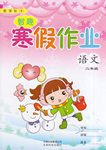题目内容
.Directions: Complete the following sentences according to the instructions given below both in English and in Chinese, using ONE word in each blank (10 points).
1.众所周知,这个奖将只颁给那些对世界和平做出了重要贡献的人们。
As is known to all, this prize will only be given to those who have ________ great ________ to world peace.
2.他看上去很粗心,可事实上他是个很细心的人。
He appears careless, but ________ ________ , he is a very careful person.
3.最后但同样重要的,我要感谢所有朋友、老师和家人的支持。
Last but ________ ________, I’d like to thank all my friends, teachers and family members for their support.
4.汽车在现代生活中起了重要作用,但有时也会带来问题,比如说空气污染。
Cars ________ an important role in modern life, but they also cause problems ________ air pollution.
5.这项工程将由一位来自湖南的女工程师负责。
A woman engineer from Hunan will be _________ __________ this project.
1.made ;contributions
2.in reality/ in fact
3.not least
4.plays; like
5.responsible for

 智趣寒假作业云南科技出版社系列答案
智趣寒假作业云南科技出版社系列答案It is common and usual to see people freak out when they face challenges in their life. We all pass in different life problems and challenges. No one is free of life problems. Only a dead man faces no problem. As long as you are alive, challenges are everywhere.
How do you face problems and challenges in your life? Problems and challenges are the building blocks of your personality. They make you who you are. Besides, whether what happened in your life builds or destructs you depends on how you look at it. If you take your problems as troubles, they will be troubles and may cause destruction. If you take them as constructive tools, you are going to be built up on them.
Problems are everywhere. No one can avoid them. And they are good too. They open up a different look and opportunity if you are willing to see. When you face troubles, do not frustrate or freak out. Just cool yourself to think in a different direction. Think in a positive way. Every problem has its own good as well as bad sides. Focus on the good one. Look at the bright side.
Besides, there is always a good person, perhaps your mom or dad, or one of your friends, right beside you who can turn everything into your best if you are willing to turn to them. No matter what happens, they will be there to help you. Trust them and they will never let you down. All you need to know is that you are loved wherever you are.
【小题1】What’s the meaning of the underlined phrase “freak out” in Paragraph 1?
| A.Feel shy. | B.Stay calm. | C.Keep up. | D.Feel upset. |
| A.problems cause troubles |
| B.attitude is everything |
| C.challenges can be avoided |
| D.personalities are built on failures |
| A.can only depend on our parents |
| B.are not alone |
| C.should only believe ourselves |
| D.are not confident |
| A.To encourage. | B.To compare. | C.To prove. | D.To explain. |
| A.How to Avoid Problems |
| B.Challenges Are Everywhere |
| C.Face Your Challenges Bravely |
| D.You Are Loved Wherever You Are |